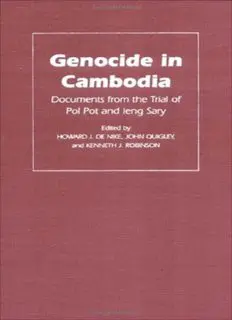
Genocide in Cambodia: Documents from the Trial of Pol Pot and Ieng Sary PDF
Preview Genocide in Cambodia: Documents from the Trial of Pol Pot and Ieng Sary
Genocide in Cambodia PennsylvaniaStudiesin HumanRights BertB. Lockwood,Jr., SeriesEditor Acompletelistofbooksintheseries isavailablefrom thepublisher. Genocide in Cambodia Documents from the Trial of Pol Pot and leng Sary Edited by HOWARDJ. DE NIKE, JOHN QUIGLEY: and KENNETHJ. ROBINSON withtheassistanceof HELENJARVIS and NEREIDACROSS PENN UniversityofPennsylvania Press Philadelphia Copyright©2000UniversityofPennsylvaniaPress Allrightsreserved PrintedintheUnitedStatesofAmericaonacid-freepaper 10 9 8 7 6 5 4 3 2 1 Publishedby UniversityofPennsylvaniaPress Philadelphia,Pennsylvania19104-4011 LibraryofCongressCataloging-in-PublicationData PolPot. GenocideinCambodia:documentsfromthetrialofPolPotandIengSary/ editedby Howard].DeNike,JohnQuigley,andKenneth].Robinson,withtheassistanceofHelen JarvisandNereidaCross. p.cm. - (Pennsylvaniastudiesinhumanrights) Includesbibliographicalreferencesandindex. ISBN0-8122-3539-8 (alk.paper) 1.PolPot-Trials,litigation,etc. 2.IengSary-Trials,litigation,etc. 3.Trials (Genocide)- Cambodia. I.IengSary. II.DeNike,Howard]. III.Quigley,JohnB. IVRobinson,Kenneth]. (KennethJay). V.Cambodia.Tribunalpopulaire revolutionnaire. VI.Title. VII.Series. KNM41.P65 P65 2000 345.596'0251-dc21 99-055971 Contents Editors' Note:TheDocumentsofthePeople's vii RevolutionaryTribunal APersonalViewoftheDocumentsofthePeople's Xl11 RevolutionaryTribunal HelenJarvis Introduction 1 John Quigley ReflectionsofaLegalAnthropologistontheTrialof 19 PolPotandIengSary Howard] DeNike Documents ListofDocuments 31 PartI. Proceduraldocuments 43 PartII. DocumentsoftheInvestigation 73 *IdentificationDocumentsoftheAccused WitnessStatements 75 ReligiousIssues 144 *IssuesoftheWorkersofTuolKauk MilitaryIssues 156 IssuesofOrdinaryCitizens 160 StatementsofFormerAgentsofPolPotandIengSary 219 ReportsofFieldInvestigations 227 CrocodilePit 227 CrematoriesinSiemReapProvince 231 CommonGravesinSiemReapProvince 241 vi Contents CommonGravesinSreSeamVillage,Chiro2Subdistrict 250 CommonGravesatChupRubberPlantation 254 CommonGravesinKompongSpeuProvince 261 InvestigationatWatChampuhKaek 278 ReportsonVariousAspectsofSocialLife 287 Excerptsfrom CapturedDocuments 379 Excerptsfrom PublishedAccounts 413 PartIII. IndictmentandJudgment 461 Indictment 463 ClosingStatements 489 Judgment 523 SourcesforAdditionalInformation 553 Acknowledgments 555 Index 557 *MissingDocuments Editors' Note: The Documents of the Peoples Revolutionary Tribunal The documents in thisvolume are those ofthe People'sRevolutionaryTri bunal, whichwas constitutedin Cambodiain 1979, in connectionwith the trial for genocide in August of that year of Pol Pot and leng Sary. The documents, which are of three types, are divided into three parts. Part I consists ofdocuments relating to the establishmentofthe tribunal. These include governmental decrees setting the tribunal's jurisdiction and ap pointingthe presidingjudgeand thejury. Theyalso include decreesofthe presidingjudgeand the prosecutingattorneyinvolvedinbringingthe case to trial. Finally, they include lists ofparticipants: witnesses, invited foreign lawyers,andinvitedforeignjournalists. Part II, the bulk of the volume, consists of the documents produced duringtheinvestigationintotheallegedoffenses.Thesedocumentsformed thebasisforconductingatrial.Theyaretheevidencegatheredbyinvestiga tors,whichfallsintofive categories: Statementsofwitnesses, relatingtheirknowledgeofacts thatmightshow genocide byPol Pot and leng Sary. The acts described are principallykill ings, and the creation ofconditions that led to deaths, such as the forced evacuation ofcitiesandforced residence in rural communeswith minimal rationsandhealthcare. Reports by government investigators offield investigations they carried outatallegedmassgravesites. Reports commissioned by government investigators and written by ex perts in particular fields ofendeavor, with regard to the impact ofthe ac tions ofPol Pot and leng Saryonvarious aspects oflife in Cambodia. The pointofthese reportswastogeneralizefrom theevidenceofparticularacts to give an overall view ofthe killings, to show how many people perished overallincertainlocations,andtoshowtheadverseimpactofKhmerRouge practicesonsocialrelations. viii Editors'Note Excerpts from Khmer Rouge documents tending to show that the prac ticesthatresultedindeathswerecentrallydirected. Accounts from the foreign press, and several locallywritten, describing atrocitiesoftheKhmerRouge. PartIII consists ofdocuments relating to the trial stage. Firstis the pros ecutor'sindictment,whichsumsup theevidencecontainedinPartII. Next are the speeches at the conclusion oftrial by the prosecutor and defense attorneys, aswell as by the invited foreign lawyers. Then comes the court's written decision, finding PolPotandIengSaryguiltyandsentencingthem todeath. ThedocumentsarepresentedinanorderdevisedbythePeople'sRevolu tionaryTribunal,whichassignedanumbertoeachdocument.Thenumber ing system groups documents ofa particular category. The headings that appearforthecategoriesaretakenfromatableofcontentsproducedatthe timeofthetrial,butnotgivenadocumentnumber. Someobviouserrorswere madebytribunalstaffinassigningnumbersto documents. Some documents had no number. In afewinstances the same number appeared on more than one document. In other instances, the documentnumberwas notconsistentamong the three languagesinwhich the documentwas issued. Some documentsbore numbers thatwouldhave assigned the document to whatwas obviously an incorrect category. In in stancesofapparenterror, theeditorshaveusedanumberthattheysurmise wasintendedfor theparticulardocument. The documentation as reflected in this volume bespeaks a proceeding thatdiffersfromthestyleofcriminalproceedingsincommonlawcountries. Itisratherin the civillawtradition asfound on the European continent, a factthatisnotsurprisingsincethelegalsysteminCambodiaisbasedonthat ofFrance,whichruledCambodiaasacolonyuntilWorldWarII. Inthecivil lawsystem, the investigation is documented meticulouslyinwriting. These documentsprovideabasisforadecisioneithertodropthecaseortotakeit to trial. These documentsare also presented to the courtpriorto the trial. Thecourthearsevidenceatthetrialandbasesitsdecisiononthatevidence. However, thepretrialdocumentsprovide the courtanindicationoftheevi denceandtherebyserveasabaseofevidencethatthetrialcourtmayeither confirm or reject after hearing the evidence presented at trial. In the civil lawsystemofprocedure,thepretrialphaseismoresignificantintheoverall fact-findinginrelationtothetrialphase,ascomparedwiththecommonlaw system. Another feature ofthe documents that reflects the civil law tradition is the detailednature ofthe indictmentand thejudgment (Document3.01). Whereas in common law countries an indictment is typically sparse, an indictment in civil law countries typically recites the evidence gathered during the pretrial investigation. Whereas in common law countries a ver dictistypicallyastatementof"guilty"or"notguilty"fromthejudgeorjury, Editors'Note ix in civil law countries thejudgment, which includes both a verdict, and, in case ofguilt, a sentence, is a detailed documentreciting the evidence that ledthecourttoitsconclusion. Still anotherfeature that is typical ofCivil Law proceedings is the inclu sion ofa claimbyvictimsfor compensation (Document3.03d). In civil law jurisdictions,a crimevictim maymake a claim, typicallyfor monetarycom pensation,thatisheardaspartofthecriminalcase,andthecourt,ifitfinds the defendant guilty, also decides ifthe victim should be compensated by the defendant. The victims are called "civil plaintiffs," meaning that they areplaintiffsinacivilactionagainsttheaccused. One other feature typical of civil lawjurisdictions is a mixed decision making panel, that is, one made up ofboth professionals and nonprofes sionals.ThepanelthattriedPolPotandIengSaryconsistedofoneindivid ual characterized as "judge," and ten others, characterized as "assessors" (Document 1.08). This reflects a way ofbringing lay persons intojudicial decisionmakingincriminalcasesdifferentfrom thatfoundincommonlaw jurisdictions,wherethelaypersons,composedasajury,serveassolefinders offact, while ajudge determines the penalty. In the civil law procedure, a mixed panel is used in some, typically more serious, cases, and the mixed panelbothdecidesonguiltorinnocenceandsetsthepenalty. In preparing thisvolumefor publication, the editorsworkedfrom mate rialsprovidedtoJohnQuigleyasaparticipantinthetrialofPolPotandIeng Sary.ThisincludedphotographstakenbySPK,theCambodiangovernment press agency, as well as typescript People's Revolutionary Tribunal docu ments. The editors gained access to additional tribunal documentsfrom a set collected in Phnom Penh in the 1990s by HelenJarvis, Head of the School of Information, Library and Archive Studies, University of New South Wales.Jarvis describes how she came upon these documents in "A PersonalViewoftheDocumentsofthePeople'sRevolutionaryTribunal,"in this volume. BothJarvis and Nereida Cross, research assistant in Informa tion, LibraryandArchive Studies, UniversityofNewSouthWales, collabo ratedwith the editorsin locatingdocuments thatwere notfound in anyof theexistingcollections. The editors referred as well to a selection ofdocuments ofthe trial as published in 1988 in Phnom Penh by a group of Cambodian lawyers in English under the title People'sRevolutionary TribunalHeldinPhnomPenhfor the Trial ofthe Genocide Crime ofthe Pol Pot-Ieng Sary Clique (August 1979): Documents, and in French under the title Tribunalpopulaire revolutionnaire siegeantaPhnomPenhpourlejugementdu crimedegenocidecommisparla clique genocidairedePolPot-IengSary (Aout1979):Documents. People's Revolutionary Tribunal Documents 2.1.1.19, 2.1.1.20, and 2.1.1.22 are pretrialstatementsofwitnesses thatthe editorswere unable to locate. These threewitnesses testifiedorallyatthe trial ofPolPotandIeng Sary,andsummariesoftheiroralstatementswerepublishedbytheMinistry
